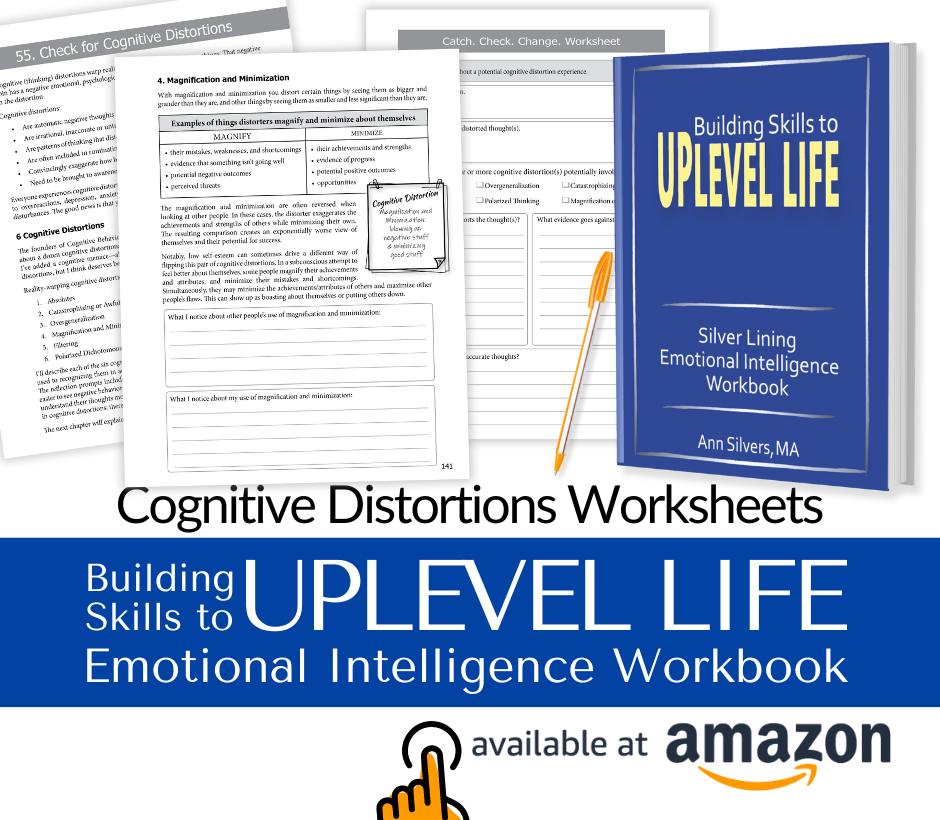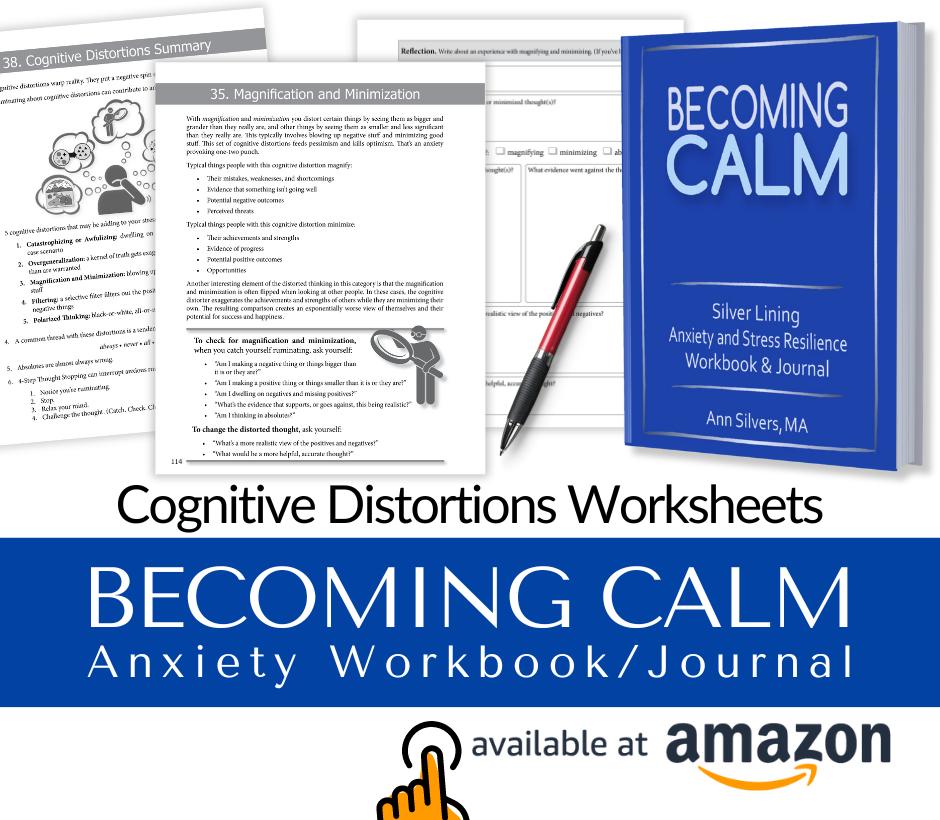List of Cognitive Distortions that Make You Stressed and Depressed

The way you look at things may be making those things feel worse than they really are. Your view of yourself and the world around you can get distorted by negative thought patterns that are so common that they have a name: cognitive distortions.
Learning how to spot cognitive distortions like polarized thinking, overgeneralization, and catastrophizing can lift your mood and help reduce stress, anxiety, and depression.
What's in This Post
| Cognitive Distortion Definition |
| CBT and Cognitive Distortions |
| What are Cognitive Distortions? |
| How Do Cognitive Distortions Hurt You? |
| Cognitive Distortions: Anxiety and Depression Connection |
| Cognitive Distortions List |
| Cognitive Distortions and Absolutes |
| Challenging Cognitive Distortions |
| Cognitive Distortions Worksheets |
Note: This post should not be taken as therapy. It is always advisable to seek individualized care with a mental health professional.
Cognitive Distortion Definition
Cognitive distortions are habitual ways of viewing yourself and the world that make things look worse than they are.
Cognitive distortions distort reality.
They put a negative spin on things. That negative spin has a negative emotional, psychological, and behavioral impact on the individual who is trapped in the distortion.
CBT and Cognitive Distortions
The founders of Cognitive Behavioral Therapy (CBT), Aaron Beck and David Burns, were the first to talk about cognitive distortions. Correcting these errors in thinking have continued to be important components of CBT.
Beck described cognitive distortions as making people create “a negative bias against themselves.”
What are Cognitive Distortions?
Cognitive distortions:
- Are automatic negative thoughts (also known as ANTs)
- Are irrational, inaccurate or untrue, and judgy—of yourself and others
- Are patterns of thinking that distort reality, how you see yourself, and how you see others
- Are often included in ruminating
- Convincingly exaggerate how bad something is
- Need to be brought to awareness so they can be taken through a reality check
How Do Cognitive Distortions Hurt You?
Everyone experiences cognitive distortions sometimes, but if left unchecked, they can contribute to depression, anxiety, anger, low self-esteem, and other mental/emotional disturbances.
Cognitive distortions can warp how you see events, yourself, and other people. They can make you think of your partner more negatively than warranted and instigate overreactions that damage relationships.
The good news is that you can learn how to challenge this faulty thinking.
Cognitive Distortions: Anxiety and Depression Connection
People with anxiety and depression tend to get stuck in their distorted thinking. That stuckness manifests as ruminating or dwelling on the negative thoughts. The ruminating creates a consuming whirlwind that will make you more and more panicked, anxious, nervous, worried, depressed, and stressed.
Training your brain to catch, check, and change this faulty thinking can reduce your anxiety, relief your depression, and increase your well-being.
Common Cognitive Distortions List
Lists of cognitive distortions range in number up to about a dozen, but I tend to focus on 5 cognitive distortions when I'm working with clients to relieve anxiety, reduce depression, and improve their well-being:
-
Catastrophizing or Awfulizing: dwelling on an exaggerated worse-than-worst-case scenario
-
Overgeneralizing: a kernel of truth gets exaggerated to cover more circumstances than are warranted
-
Magnification and Minimization: blowing up negative stuff and minimizing good stuff
-
Filtering: a selective filter filters out the positive things that happen and keeps the negative things
-
Polarized Thinking: black-or-white, all-or-nothing, dichotomous thinking

Cognitive Distortions and Absolutes
It is noteworthy that a common thread with these distorted ways of thinking is a tendency to think in absolutes:
- always
- never
- all
- none
Absolutes are almost always wrong.
Absolutes make things feel worse than they really are.
They will make you feel like you are globally bad, rather than seeing the isolated things you might be bad at. They make you think that things will never be better, rather than allowing you to recognize that while something might be bad now, it may be better in the future.
Challenging Cognitive Distortions
Cognitive distortions can be challenged using the 3 C's: Catch, Check, Change.
-
Catch. Identify the thought that came before the emotion or was spinning in your head as you ramped up.
-
Check. Reflect on how rational, accurate, and useful the thought is. Question whether it is based on overreactions and/or cognitive distortions.
-
Change. Replace the thought with something more accurate and useful.
Cognitive Distortions Worksheets
Two of my workbooks include information and exercises for identifying and overcoming your use of cognitive distortions. Each of these books provides different opportunities for working with your cognitive distortions and using the Catch, Check, Change method to challenge them:
Building Skills to Uplevel Life: Silver Lining Emotional Intelligence Workbook
Becoming Calm: Silver Lining Anxiety and Stress Resilience Workbook and Journal
- Ann Silvers








Comments 0